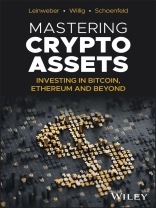A definitive, all-encompassing book on digital assets of all types for investors
In Mastering Crypto Assets: Investing in Bitcoin, Ethereum and Beyond, a team of seasoned investors and digital asset strategists presents a comprehensive guide aimed at institutional and professional investors for integrating crypto assets into traditional portfolios. The book offers in-depth explanations of the structure of this new asset class and its impact on investment portfolios.
It guides readers on using fundamental and quantitative criteria to select blockchain-based assets, grounded in a robust foundation of knowledge and evidence. The authors demonstrate how to apply quantitative valuation concepts to digital assets like Bitcoin, understanding their role as digital stores of value in a traditional investment portfolio.
The book also delves into the unique risk and return characteristics of various digital asset sectors, adapting conventional investing methods to the digital realm. It goes beyond direct crypto asset investments, introducing related equities and strategies for accessing digital assets in restricted settings. It discusses both indexed and active strategies in the context of crypto assets.
A key feature of the book is exclusive interviews with industry figures such as Jan van Eck (Van Eck), Peter L. Brandt (Legendary Trader), and Fred Thiel (Marathon Digital), with these interviews accessible through QR codes in the book for extended video content. This provides a dynamic and interactive learning experience.
Moreover, the book benefits from invaluable research assistance from Figment and CCData, enriching its analytical depth. It also includes insightful guest articles from digital asset experts like Matthew Sigel (Van Eck), Marco Manoppo (Digital Asset Research), Marcel Kasumovich (Coinbase Asset Management), Timothy Peterson (Cane Island Digital Research), Gregory Mall and Rohan Misra (AMINA), and thought leaders from Token Terminal.
Mastering Crypto Assets is an invaluable resource not just for institutional and individual investors, but for anyone keen on adopting a sound, evidence-based approach to digital asset investment.
Table of Content
Acknowledgments ix
Preface xi
Chapter 1: Introduction. 1
Chapter 2: Bitcoin— A Brief History 3
2.1 From the Fuel Card to the Trustless Payment System 4
2.2 Enter Satoshi Nakamoto 7
2.3 Bitcoin and Blockchain: A Closer Look 9
2.4 The Fundamentals of Bitcoin 11
2.5 The Driving Forces behind the Rise of Bitcoin 15
2.6 Interview with Fred Thiel 17
2.7 References 25
Chapter 3: The Taxonomy of Crypto Assets 27
3.1 Navigating the Crypto Categorization 27
3.2 The Difference between Token and Coin 29
3.3 Payments 30
3.4 Stablecoins 35
3.5 Smart Contract Platforms 41
3.6 Infrastructure Applications 51
3.7 Centralized Exchanges 57
3.8 Decentralized Finance 61
3.9 Non- fungible Tokens 66
3.10 Media and Entertainment 68
3.11 Conclusion 74
3.12 References 74
Chapter 4: Valuation of Crypto Assets 77
4.1 Tokens Explained: What They Are and Why They Matter 77
4.2 Value Capturing in Crypto: Market Dynamics 82
4.3 Due Diligence: The Importance of Digital Asset Vetting 88
4.4 The Network Effect and Metcalfe’s Law 97
4.5 Statistical Valuation Approach 111
4.6 References 115
Chapter 5: Cryptos as an Asset Class. 117
5.1 Characteristics of an Asset Class 117
5.2 Conventional Asset Classes 118
5.3 Crypto Assets 140
5.4 Crypto Assets in the Portfolio Context 154
5.5 Crypto Stocks: Alternative, Addition, or Neither? 164
5.6 Interview with Jan van Eck 175
5.7 Conclusion 189
5.8 References 190
Chapter 6: Asset Allocation. 193
6.1 Foundations of Asset Allocation 194
6.2 Approaches to Asset Allocation 202
6.3 Navigating Crypto Cycles—More Than a Story 209
6.4 Influence of Different Crypto Asset Allocations 219
6.5 Dynamic Risk Management 229
6.6 Interview with Peter L. Brandt 234
6.7 Conclusion 248
6.8 References 249
Chapter 7: From Staking to Earning. 251
7.1 Background of Crypto Staking 251
7.2 The Case for Staking 252
7.3 The Origin and Mechanism of Staking Rewards 255
7.4 Case Study: Understanding Ethereum Staking Rewards Post- Merge 256
7.5 How to Participate in Protocol Staking 261
7.6 Understanding Staking Risks 263
7.7 Liquid Staking Protocols 265
7.8 Conclusion 266
7.9 References 267
Chapter 8: Index Investments 269
8.1 Theory Underlying the Case for Index- Based Investments 269
8.2 Digital Asset Indexing 280
8.3 The Importance of Exchange Vetting and Clean Prices for Institutional Investors 282
8.4 Pricing: The Foundation of Capital Markets 286
8.5 Moving Out the Risk Curve— The Benefits of Investing in a Multi- Token Index 291
8.6 Crypto Indexing: Can Traditional Strategies Translate to the Fast- Paced Digital Asset Market? 299
8.7 Refining Crypto Asset Portfolios: Risk Parity and Beyond— Exploring Advanced Indexing Strategies in Crypto 303
8.8 Benchmark Rates: Safe against Manipulation? 309
8.9 Conclusion on Index Investments 315
8.10 References 316
Chapter 9: Outlook: Navigating the Future— The Expansive Potential of Digital Assets 319
9.1 Reference 323
About the Authors. 325
Index 327
About the author
MARTIN LEINWEBER, CFA, is a Digital Asset Product Strategist at Market Vector Indexes, offering product development, research, and thought leadership. Before joining Market Vector, Martin was instrumental in managing active funds for large European institutional investors.
JÖRG WILLIG serves as the Head of Portfolio Management at a renowned private bank and has over two decades of experience managing funds for both institutional and private clients. He oversees the development of systematic investment strategies that encompass fixed income, equity, and real assets portfolios.
STEVEN SCHOENFELD is the CEO of Market Vector Indexes, a leading global index and data provider for equities, fixed income, and digital assets. He has 40 years of experience working in the investment management industry, including senior fiduciary positions at Northern Trust and Barclays Global Investors, and led the development of investable emerging market indexes at IFC/World Bank.












